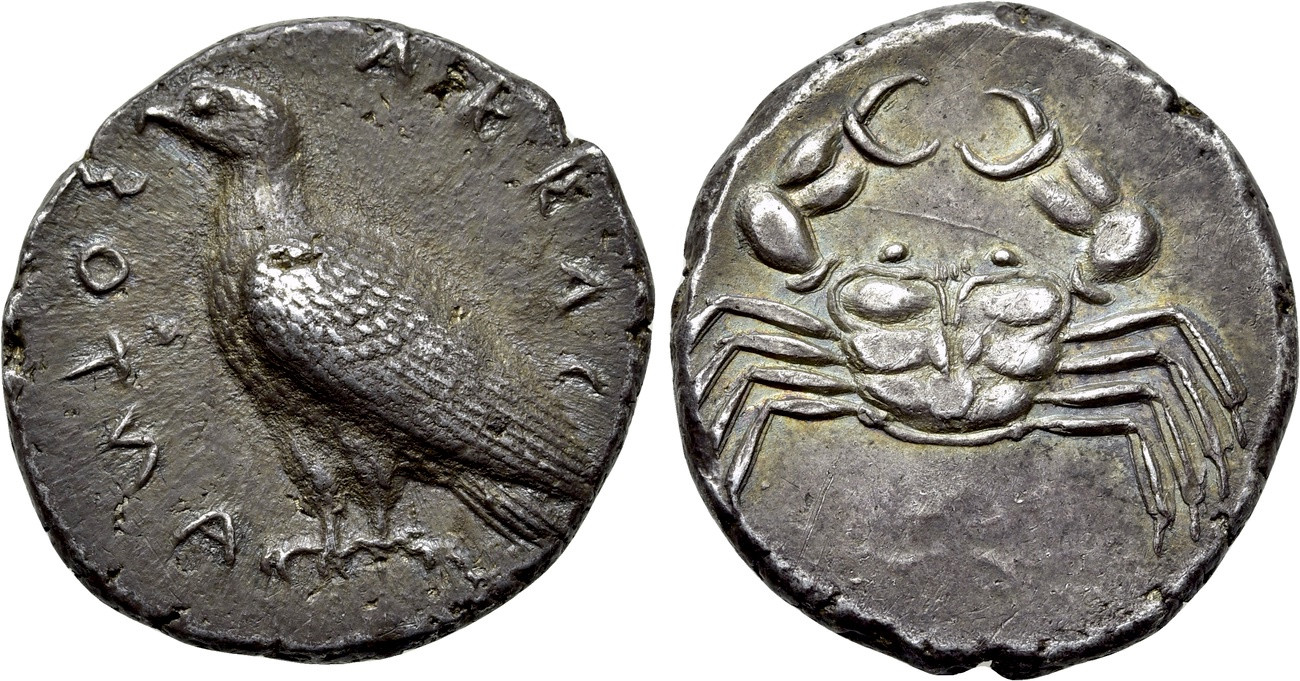1959 - Metapontum (nomos ear of barley/ear of barley) over Agrigentum (eagle/crab) (CNG, MBS 82, Sept. 2009, 165)
From SILVER
540 BCE - 510 BCEMETA
Images
Overstruck variety

Agrigentum 510-500.jpg [1]
Location/history
| Sale(s)Sale(s) ᵖ: | Classical Numismatic Group MBS 82 (16/09/2009), lot 165 ; UBS 59 (29/01/2004), lot 5183 (part of). | |
| Private collection(s)Private collection(s) ᵖ: | C. E. Pitchfork Collection |
Overstriking coin
Description
| ObverseInscription or printing placed on the obverse.: | META (Greek) Ear of barley with five grains. Decorated border. | ReverseInscription or printing placed on the reverse.: | Incuse ear of barley with [six] grains. Border of rays (incuse). |
Mint and issuing power
| MintIdentifies the place of manufacture or issue of a numismatic object.: | Metapontum | Ancient regionAncient region. | Lucania | Modern countryModern country: Italy | AuthorityIdentifies the issuing power. The authority can be "pretended" when the name or the portrait of X is on the coin but he/she was not the issuing power. It can also be "uncertain" when there is no mention of X on the coin but he/she was the issuing power according to the historical sources: |
Chronology
| FromIdentifies the initial date in a range assigned in a numismatic context. 540 BCE toIdentifies the final date in a range assigned in a numismatic context.. 510 BCE | Archaic until 480 BC |
Physical description
| MetalThe physical material (usually metal) from which an object is made.: Silver |
WeightWeight of the numismatic object (in grams). in grams: 7.917.91 g <br />7,910 mg <br /> | DenominationTerm indicating the value of a numismatic object. Examples: tetradrachm, chalkous, denarius.: nomos | AxisDescribes the directional relationship between the obverse and reverse of a numismatic object.: 1212 mm <br />1.2 cm <br /> |
| StandardStandard.: Achaian | |||
References
| Coin referenceReference of the Coin: | Coin series referenceReference to coin series study: | Noe 19271Noe 1927, n° 244, HN Italy2HN Italy, n° 1459, 1463, 1465, 1467, 1470, 1472, 1474, 1479, 1481-1486., HGC 13HGC 1, n° 1027-1029 | |
| Coin series web referenceCoin series web references: | |||
Overstruck type
Description
| ObverseInscription or printing placed on the obverse.: | Sea eagle standing left with folded wings (AK on left and traces of the eagle on right visible on reverse of the coin). | ReverseInscription or printing placed on the reverse.: | Cab (visible on obverse of the coin) |
Mint and issuing power
| MintIdentifies the place of manufacture or issue of a numismatic object. ᵖ: | Agrigentum | Ancient regionAncient region. ᵖ | Sicily | Modern countryModern country: Italy | AuthorityIdentifies the authority in whose name (explicitly or implicitly) a numismatic object was issued. ᵖ: |
Chronology
| FromIdentifies the initial date in a range assigned in a numismatic context. 540 BCE toIdentifies the final date in a range assigned in a numismatic context.. 510 BCE | Archaic until 480 BC |
Physical description
| DenominationTerm indicating the value of a numismatic object. Examples: tetradrachm, chalkous, denarius. ᵖ: | didrachm |
StandardStandard. ᵖ: | Attic |
References
| Coin type referenceReference to coin series study ᵖ: | Westermark 20184Westermark 2018 | ||
| Coin series web reference overstruckCoin series web references overstruck: | |||
Additional data
| Frequency of overstrikesFrequency of overstrikes: | frequent | Level of confidenceLevel of confidence of the identification: | sure |
| RemarksRemarks: | "Overstruck on an Akragas Didrachm, the obverse exhibits AK on left and traces of the eagle on right. The reverse clearly shows a crab" | ||
References
- ^ Noe, Sydney P. (1927), The coinage of Metapontum. Part 1, Numismatic Notes and Monographs 32, New York.
- ^ Rutter N. Keith et alii (eds.) (2001), Historia Numorum Italy, London, xvi, 223 p., 43 pl.
- ^ Hoover, Oliver D. (2018), The Handbook of Greek Coinage Series, Volume 1. Handbook of Coins of Italy and Magna Graecia, Sixth to First Centuries BC., Lancaster-London, 2018, lxi, 527 pages, 23 cm
- ^ Westermark, Ulla (2018), The coinage of Akragas c. 510-406 BC, 2 vol., Uppsala.
